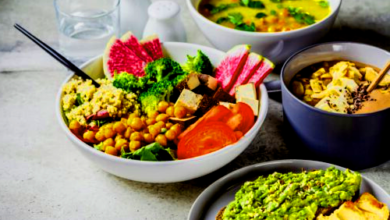Gluten-Free Diet: Pros, Cons & Delicious Meal Ideas
A gluten-free diet has gained immense popularity in recent years, whether due to medical conditions such as celiac disease

A gluten-free diet has gained immense popularity in recent years, whether due to medical conditions such as celiac disease or gluten sensitivity, or simply as a personal choice for improved health and well-being. While eliminating gluten—a protein found in wheat, barley, and rye—can offer several benefits, it also comes with certain challenges. Understanding the pros and cons of a gluten-free lifestyle, along with some delicious meal ideas, can help individuals make informed choices and enjoy a balanced, satisfying diet.
With the increasing availability of gluten-free products, it has become easier to adopt this dietary change. However, it is crucial to ensure that nutritional needs are met while avoiding gluten. Many people mistakenly assume that gluten-free equals healthier, but this is not always the case. A well-planned gluten-free diet should include nutrient-rich whole foods to prevent deficiencies and maintain optimal health. This article delves into the advantages and drawbacks of a gluten-free diet, offering insights into how to make it both enjoyable and nutritionally sound.
The Pros of a Gluten-Free Diet
Relief from Gluten-Related Disorders
One of the most significant benefits of a gluten-free diet is that it helps individuals who suffer from celiac disease, non-celiac gluten sensitivity, or wheat allergy. Celiac disease is an autoimmune disorder where gluten consumption damages the small intestine, leading to nutrient malabsorption and various health complications. A gluten-free diet is the only effective treatment for managing this condition. Similarly, people with gluten sensitivity may experience digestive discomfort, headaches, or fatigue after consuming gluten, and eliminating it from their diet can provide symptom relief.
Improved Digestive Health
Going gluten-free can improve gut health for those who experience bloating, gas, diarrhea, or constipation due to gluten intolerance. Many individuals report feeling less sluggish and more energized after removing gluten from their meals. Whole, unprocessed gluten-free foods such as fruits, vegetables, lean proteins, and gluten-free grains like quinoa and rice can contribute to better digestion and overall gut health.
Potential Weight Loss and Healthier Eating Habits
A gluten-free diet often leads to a reduction in processed food intake, as many processed foods contain gluten. People who focus on naturally gluten-free foods, such as lean proteins, fresh produce, and whole grains, may experience weight loss and improved overall health. By being more mindful of food choices, individuals often develop healthier eating habits, leading to increased energy levels and better overall well-being.
Reduced Inflammation
For those with celiac disease or gluten sensitivity, consuming gluten triggers inflammation in the body. By eliminating gluten, the inflammation subsides, reducing symptoms like joint pain, headaches, and digestive distress. Some people who do not have gluten-related disorders also claim to experience reduced inflammation and better overall health on a gluten-free diet, though more research is needed to support this claim.
Increased Awareness of Nutritional Choices
Adopting a gluten-free diet often requires individuals to pay closer attention to ingredient labels and meal planning. This increased awareness can lead to better food choices, including a higher intake of whole foods and a reduced dependence on processed snacks. Many people also become more conscious of their body’s responses to different foods, allowing them to tailor their diet for optimal health.
The Cons of a Gluten-Free Diet
Nutritional Deficiencies
One of the biggest challenges of a gluten-free diet is the risk of nutrient deficiencies. Many gluten-containing foods, such as whole wheat bread and fortified cereals, are significant sources of fiber, B vitamins, and iron. Without proper meal planning, individuals may miss out on these essential nutrients. It is important to include alternative sources of fiber (such as fruits, vegetables, and legumes) and essential vitamins and minerals (such as nuts, seeds, and fortified gluten-free products) in the diet.
Higher Costs and Limited Availability
Gluten-free products tend to be more expensive than their gluten-containing counterparts. Specialized gluten-free breads, pastas, and baked goods often come with a higher price tag due to the additional processing required to remove gluten. Additionally, finding high-quality gluten-free options in restaurants and grocery stores can sometimes be challenging, making it harder for those following the diet to maintain variety and convenience.
Potential for Unhealthy Substitutions
Just because a product is labeled gluten-free does not mean it is inherently healthier. Many gluten-free processed foods contain added sugars, unhealthy fats, and artificial ingredients to improve taste and texture. Consuming too many of these foods can lead to weight gain and other health issues. It is essential to focus on whole, naturally gluten-free foods rather than relying on processed gluten-free alternatives.
Social and Lifestyle Challenges
Adhering to a gluten-free diet can be socially challenging, especially when dining out or attending events. Many restaurants may not offer gluten-free options or may not take cross-contamination seriously. Individuals may also feel isolated or inconvenienced when family and friends do not understand the dietary restrictions. Proper communication and planning are necessary to navigate these situations effectively.
Psychological Impact
For some people, constantly monitoring food choices and worrying about gluten contamination can lead to anxiety and stress. A strict gluten-free diet requires vigilance, which can be overwhelming, particularly for those who are new to the lifestyle. While necessary for individuals with celiac disease, those choosing the diet for non-medical reasons should consider whether the potential stress outweighs the benefits.
Delicious Gluten-Free Meal Ideas
Breakfast
- Oatmeal with Fresh Berries and Nuts: Use certified gluten-free oats topped with almonds, walnuts, and fresh berries for a fiber-rich start to the day.
- Egg and Avocado Toast: Swap regular bread for gluten-free toast and top it with mashed avocado and poached eggs.
- Smoothie Bowl: Blend bananas, spinach, almond milk, and protein powder, then top with chia seeds and granola.
Lunch
- Quinoa Salad with Grilled Chicken: Toss cooked quinoa with grilled chicken, cherry tomatoes, cucumbers, and a lemon vinaigrette.
- Lettuce Wraps: Use large lettuce leaves as a wrap for turkey, hummus, and shredded carrots.
- Sweet Potato and Black Bean Tacos: Use corn tortillas and fill them with roasted sweet potatoes, black beans, and avocado.
Dinner
- Grilled Salmon with Roasted Vegetables: A simple, nutritious meal packed with omega-3 fatty acids and fiber.
- Gluten-Free Pasta Primavera: Use gluten-free pasta with sautéed zucchini, bell peppers, and parmesan cheese.
- Stuffed Peppers: Fill bell peppers with ground turkey, rice, and tomato sauce for a hearty meal.
Snacks
- Rice Cakes with Peanut Butter and Banana
- Hummus with Carrot and Cucumber Slices
- Greek Yogurt with Honey and Nuts
Read More :Gluten-Free Diet: Pros, Cons & Delicious Meal Ideas
Conclusion
A gluten-free diet can be beneficial for individuals with celiac disease, gluten sensitivity, or wheat allergies, offering relief from digestive issues and other health concerns. It can also promote healthier eating habits and greater nutritional awareness. However, it is important to approach this diet carefully to avoid nutrient deficiencies, high costs, and reliance on processed gluten-free products. Social and psychological challenges may arise, but with proper planning, a gluten-free lifestyle can be fulfilling and balanced. By focusing on whole, naturally gluten-free foods, individuals can enjoy a varied and nutritious diet while reaping the benefits of avoiding gluten.
FAQs
1. Is a gluten-free diet healthier for everyone? Not necessarily. A gluten-free diet is essential for those with celiac disease or gluten sensitivity but does not automatically make it healthier for everyone. A balanced diet with whole foods is key.
2. Can you lose weight on a gluten-free diet? Yes, if you focus on whole, unprocessed foods and avoid high-calorie gluten-free substitutes, weight loss may occur.
3. What are some naturally gluten-free foods? Fruits, vegetables, meat, fish, eggs, dairy, nuts, seeds, rice, quinoa, and potatoes are naturally gluten-free.
4. How can I ensure I get enough fiber on a gluten-free diet? Include fiber-rich foods such as fruits, vegetables, legumes, seeds, and gluten-free whole grains like quinoa and brown rice.
5. Is it expensive to follow a gluten-free diet? Yes, gluten-free products can be more expensive, but focusing on naturally gluten-free whole foods can help reduce costs.











